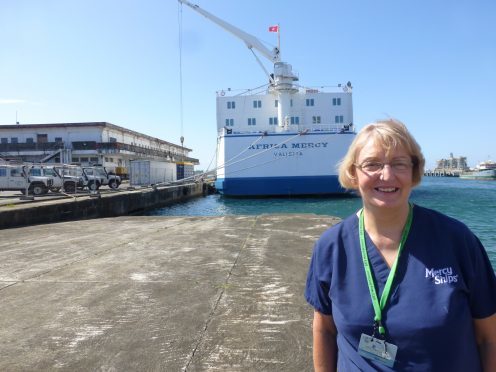Taking health aid across the world can be a dangerous and emotionally draining experience, but it is one that Sandra Campbell is not daunted by.
When most people get to retirement age, they think of living a quieter life, playing golf, or taking up a new hobby. Sandra Campbell chose something else.
After a career in nursing, her new pastime takes her to some of the most troubled areas in the world, where she sees things most of us could never imagine.
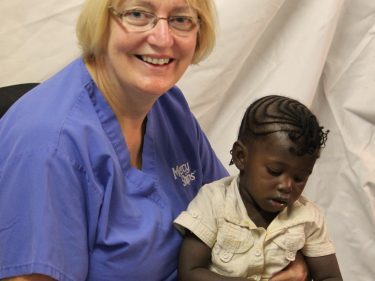
Sandra, 66, leaves her family and home in Ellon for two months of the year and travels to developing countries where Mercy Ships offer health aid. Mercy Ships are fully equipped floating hospitals which volunteers live on for months at a time. These ships dock in the ports of countries who are in desperate need of essential health care and remain there for 10 months.
Sandra first heard about the charity when she saw one of its ships docked in Edinburgh more than 20 years ago, and it is something that had always remained in the back of her mind.
“I think I had always had an interest in doing something overseas, in a third world country, and I knew that nursing was something that I could use to help other people,” said Sandra, who has been a nurse since 1971 and worked at the Foresterhill campus in Aberdeen.
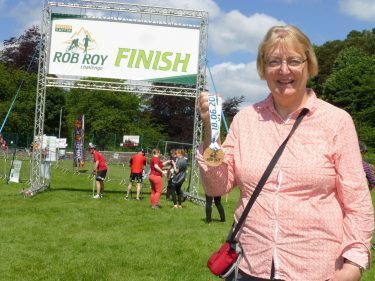
“I retired in December, 2009 and I thought that I would just go on the website and see what they had to offer, because I had the time now, and they were appealing for nurses to go to Haiti after the earthquake. I really wanted to do it and something inside me said it was for me.
“I had to persuade my husband, Jim, so that took a wee while. Eventually he realised that my heart was lying there and he let me go, very kindly. The ship wasn’t there in Haiti, but Mercy Ships were providing the support for a mission which had been there for 20 years. The charity had set up a medical clinic and a medical tent for the victims. I went and spent a month there and when I came back, everybody wanted to hear about it.”
Sandra was lucky she had friends at home to talk to. Working as a nurse in Haiti was a difficult experience and she worked in a medical tent looking after the victims of the earth quake. Later, on board the ships, she would witness illnesses and tumours which had got out of hand because of the lack of health care available to some people.
“The next year I took a couple of weeks and went to Sierra Leone, just as a pair of hands, not as a nurse. I wasn’t sure whether my career pathway would fit in with their needs so I went on the ship and spoke to human resources there. They gave the option of an admissions nurse, and I thought I could do that because I had been assessing patients on NHS 24 for five years.
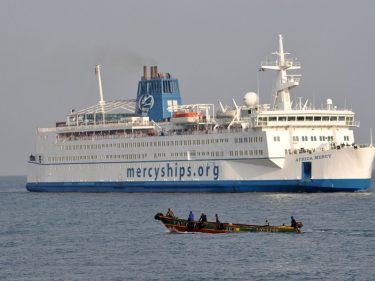
“The next year I went to Guinea in West Africa for two months as an admissions nurse and every year since then I have been out. I went to Congo for two months and last year I did two months’ service in Madagascar. Then another month relieving for somebody who had gone off sick in November last year and I am due to go out again at the end of January to Benin.”
All of the travelling and experiencing different cultures makes the lifestyle seem exciting. Sandra undergoes jabs, long days and nights and even a bit of danger, but that doesn’t stop her going back.
All the volunteers go through a very strict medical with vaccines to guard them against tropical diseases before they can go anywhere. They are also supported psychologically, both at home and on the ships, because of the difficult experiences they sometimes have.
Sandra said: “I think there is an emotional cost to pay for that kind of work, because you are seeing things in extremes. Because you are a nurse, you have to build up coping strategies which do help you. It can be very tiring as well and you have to adapt to different cultures.”
Travelling to countries who struggle economically and are in the midst of political turmoil comes with its risks. An advance team goes to the locations almost six months in advance of the ship’s arrival to negotiate with governments and health boards.
Ships docks in the port and an area is sectioned off where they build an admissions tent. Crew members and the medical teams must carry security passes to get back onto the ship which is heavily guarded.
“We ask them to cordon off an area of the dock where we are going to be and then we get guards, quite often armed, and sometimes Gurkhas for security,” said Sandra, describing how they are kept safe.
“We have a curfew when you have to be back on board by a certain time because there are dangers in the community, like gangs. In Madagascar you had to be back on board by 9pm because there was no public transport if you went out for a meal or something.
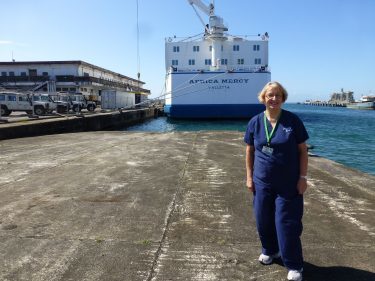
“In some places the women aren’t allowed to go out by themselves to the market, so you had to organise yourself in a group. There was one occasion, in Congo, where there had been trouble with riots and we were confined to the ship for several days because of the danger of going out into the community.
“They do warn us when we go onto the ship of the dangers of going out. Every port in the world has its dangerous areas. There was once a beach where we could walk so far along to a wreck of a pier but you couldn’t go beyond that because you’d be in gangland, but they tell you what your limits are.”
There may be some risks, but the benefits far outweigh them for the volunteers. Patients come from all over the country wherever the Mercy Ship is located, sometimes having travelled for days to get to the desperately needed medical attention. Sandra talked about one patient, Sambany, a rice farmer. He had a tumour the size of two male heads on his neck, draining blood from the rest of his body, and weighing more than 36lbs.
Sambany sold one of his rice fields to pay for local doctors, but they couldn’t do anything to help him. He was lying ready to die, when he heard a broadcast about the medical ships. He sold another field to pay for transportation, but in the mountains of Madagascar he was far from any roads.
Sambany was carried by several men for two days to the nearest road. When he arrived at the hospital ship, the surgeons were concerned that the growth was too complex and he was going to die. He told them that he was going to die anyway, but at least this way he had tried.
After 12 hours in the surgery, several blood transfusions and 48 hours of intensive care later, Sambany made an amazing recovery.
Sandra said: “He is still alive and there was a recent video made where they followed him back to his village and saw how his wife and the villagers received him. He used to come to the outpatients for his dressings and he smiled at everybody, shook hands, laughed and thanked everyone. He is a lovely, lovely man.”
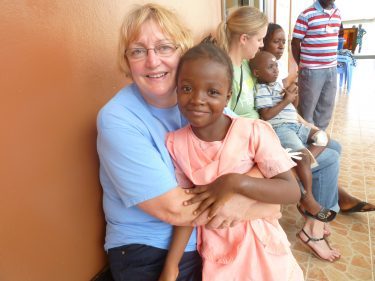
The floating ship has everything that a normal hospital would. There are four operating theatres, five wards, an eye surgery and a dental clinic. Sandra and the other admissions nurses are in a tent on the docks to maximise space and do all the preparations before the patients come aboard.
This can be everything from blood tests, nutritional assessments and sometimes HIV tests.
After all of these tests, patients can go into the wards and wait for the surgeons and doctors. The charity gives free surgical care to patients in the poorest countries who don’t have access to health care because of insufficient funding or facilities. Since a lot of people can’t get the health care that many of us expect as normal, fairly minor ailments can develop into extremes.
Sandra has seen tumours, burns caused by cooking on open fires, cleft palettes and malnourished babies – there’s an infant feeding programme to relieve this.
“The ship is like a floating town. We even have a Starbucks and an internet cafe. There are families who live on the ship, who might be doctors or surgeons and there is a school for their children,” said Sandra.
But it’s not in the least luxurious. Imagine if you can, living on a ship for two months, with a bunk bed measuring six foot square as your home. Sandra shares a room with anything from four to 10 nurses. It sounds small, but when they are up at six in the morning and working with patients all day, the inhabitants of the Mercy Ships don’t spend much time in their quarters.
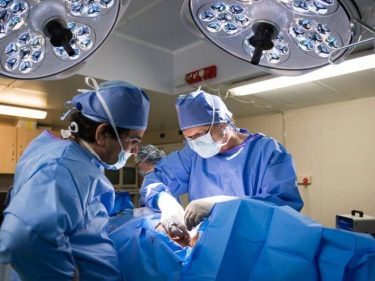
“It’s very busy,” said Sandra.
“You start at about six in the morning because breakfast is very early and sometimes there is a staff meeting before we start. The admissions nurses prepare the bread and butter for the patients at lunch time as well before we start, so there are all sorts of little things. But you don’t have any housework to do because there are people coming on board to do that, which is very nice for me – it’s a bit like a working holiday.”
All their meals are cooked for them but volunteers do their own personal laundry and clean their own cabins.
Sandra’s husband and 23-year-old son, David, have adapted to her unusual lifestyle and even raise funds for the charity.
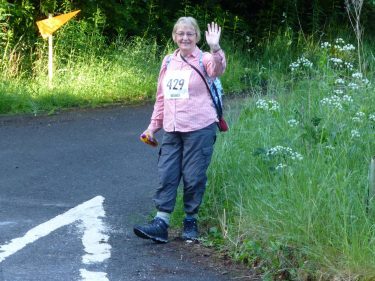
“My husband has been amazing. He has been a great support to me. It has been quite a journey, a lot of experiences, a lot of insight into different cultures. I think it is one of the most fulfilling things I have ever done in my life.
“I have done a lot of nursing but I just feel that it is a calling, really. I feel all the life experiences I’ve gained as a parent, nurse and Christian have come together and although I’m retired, I am still using my life skills to help others.”
You can watch Sambany’s return home athttps://www.youtube.com/ watch?v=I0cVIbIkR-0
More information on Mercy Ships is at www.mercyships.org.uk
